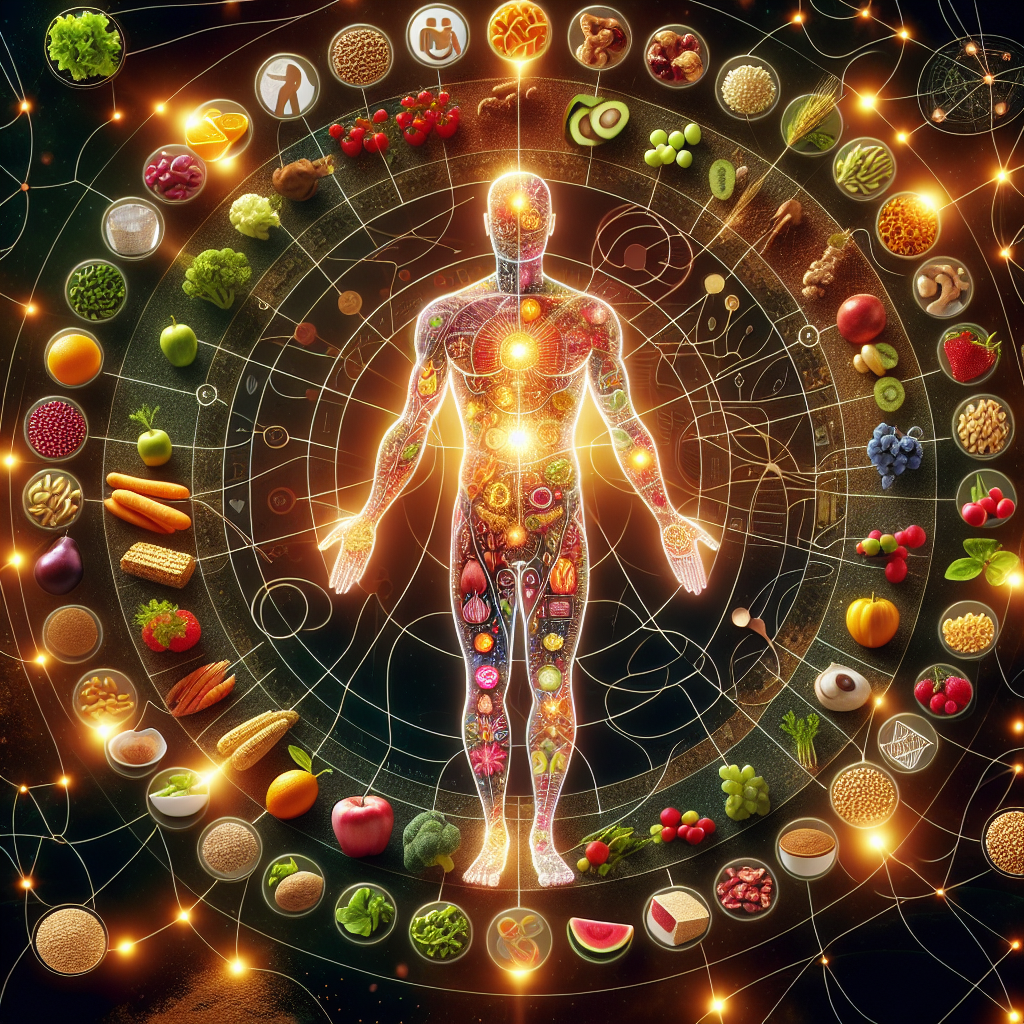Holistic Health Through Human Design and Nutrition

Discover the power of holistic health through human design and nutrition. Embrace a healthier, more vibrant lifestyle today. Visit www.myvibrantvitality.com now.
Exploring the Connection Between Human Design and Holistic Health
Holistic health is a comprehensive approach to wellness that considers the whole person — body, mind, spirit, and emotions — in the quest for optimal health and wellness. It is a lifestyle approach that goes beyond merely eliminating symptoms and seeks to help individuals achieve a higher level of wellbeing. One of the ways to achieve holistic health is through understanding our unique human design and aligning it with proper nutrition.
Human design is a system that combines astrology, the I Ching, Kabbalah, the Hindu-Brahmanic chakra model, and quantum physics to provide a unique and specific understanding of a person’s life. It offers a map or a manual that explains how you are uniquely designed to navigate the world. It helps you understand your strengths, your vulnerabilities, and most importantly, your potential.
The human design system believes that every person has a unique design, a blueprint, if you will, that dictates how they interact with the world around them. This design is believed to be imprinted in our genetic code at the time of our birth, and it remains constant throughout our lives. It is a tool that can help us understand ourselves better, make decisions that are in alignment with who we are, and ultimately lead a life that is in harmony with our true nature.
On the other hand, nutrition plays a vital role in holistic health. The food we consume can either enhance our health or contribute to disease. A balanced diet provides the body with essential nutrients required for the body to function optimally. It is not just about eating the right foods but also about understanding how different foods affect our bodies.
The connection between human design and nutrition is a fascinating one. According to human design, each of us has a unique digestive system that is best suited to certain types of foods and eating habits. This means that what works for one person may not necessarily work for another. For instance, some people might thrive on a vegetarian diet, while others might need a diet rich in proteins. Some might need to eat small meals throughout the day, while others might do better with three large meals.
Understanding your human design can provide valuable insights into what type of diet might work best for you. It can help you understand why certain diets have failed in the past and guide you towards a way of eating that is in alignment with your unique design. This, in turn, can lead to improved health, increased energy, and a greater sense of wellbeing.
In conclusion, the integration of human design and nutrition offers a holistic approach to health and wellness. It encourages individuals to understand their unique design and align it with their nutritional choices. This approach not only promotes physical health but also emotional, mental, and spiritual wellbeing. It is a journey of self-discovery, self-understanding, and self-love. It is about embracing who we are, understanding our bodies, and making choices that support our overall health and wellbeing. It is about living in harmony with our true nature and achieving a state of holistic health.
Incorporating Nutrition into Your Human Design for Optimal Wellness

Holistic health is a comprehensive approach to wellness that considers the whole person, including physical, emotional, and spiritual well-being. One of the most innovative ways to achieve holistic health is through the integration of human design and nutrition. Human design is a system that combines astrology, the I Ching, Kabbalah, Hindu-Brahmin chakra model, and quantum physics to provide a unique and individualized blueprint of a person’s genetic makeup. This blueprint can guide individuals in making decisions that align with their true nature, leading to a more fulfilling and healthy life.
Incorporating nutrition into your human design is a powerful way to optimize your wellness. Nutrition is a fundamental aspect of health, and when tailored to your unique human design, it can significantly enhance your physical and mental well-being. The concept of bio-individuality, which suggests that each person has unique food and lifestyle needs, aligns perfectly with the principles of human design.
To begin with, understanding your human design type can provide valuable insights into your nutritional needs. There are four types in human design: Manifestors, Generators, Projectors, and Reflectors. Each type has a unique digestive profile, which can guide you in choosing foods that are most beneficial for your body. For instance, Manifestors may benefit from eating small, frequent meals throughout the day, while Generators might thrive on a more substantial, protein-rich diet.
Moreover, human design goes beyond just identifying the right foods for your type. It also provides insights into how and when you should eat. For example, some people are designed to eat in a calm and quiet environment, while others may benefit from eating in a more stimulating setting. Similarly, some individuals might digest their food better when consumed at specific times of the day.
In addition to tailoring your diet to your human design, it’s also essential to consider the quality of the food you consume. A diet rich in whole, unprocessed foods can provide the nutrients your body needs to function optimally. Foods that are high in antioxidants, such as fruits and vegetables, can help protect your cells from damage. Similarly, foods rich in omega-3 fatty acids, like fatty fish and flaxseeds, can support brain health.
Furthermore, hydration plays a crucial role in overall health. Water is essential for various bodily functions, including digestion and nutrient absorption. Therefore, ensuring you drink enough water throughout the day is vital for optimal wellness.
However, it’s important to remember that nutrition is just one aspect of holistic health. Other factors, such as sleep, stress management, and physical activity, also play a significant role in your overall well-being. Therefore, while incorporating nutrition into your human design can greatly enhance your health, it’s also essential to consider these other aspects of wellness.
In conclusion, the integration of human design and nutrition offers a unique and personalized approach to holistic health. By understanding your human design type and tailoring your diet accordingly, you can optimize your nutritional intake and enhance your overall well-being. However, remember that holistic health is a comprehensive approach that considers all aspects of wellness. Therefore, while nutrition is a crucial component, it’s also important to pay attention to other factors like sleep, stress management, and physical activity.
The Role of Human Design in Shaping a Holistic Approach to Health and Nutrition
Holistic health is a comprehensive approach to wellness that considers the whole person, including physical, emotional, and mental aspects. It is a lifestyle that encourages balance, self-care, and a deep understanding of one’s unique needs. One of the most intriguing and innovative ways to achieve this balance is through the integration of human design and nutrition.
Human design is a system that combines elements of astrology, the I Ching, Kabbalah, Hindu-Brahmanic system, and quantum physics to provide a unique blueprint of an individual’s nature, capabilities, and challenges. It offers profound insights into our psychological makeup, decision-making process, and life purpose. When applied to health and nutrition, human design can guide us towards a diet and lifestyle that aligns with our unique genetic makeup, leading to optimal health and well-being.
The role of human design in shaping a holistic approach to health and nutrition is multifaceted. Firstly, it helps us understand our unique dietary needs. Each of us has a unique body type, and what works for one person may not work for another. Human design provides a detailed map of our genetic makeup, which can guide us towards the foods and eating patterns that are most beneficial for our individual bodies.
For instance, some people may thrive on a plant-based diet, while others may need more protein. Some may benefit from eating small, frequent meals, while others may do better with three square meals a day. By understanding our human design, we can tailor our diet to our unique needs, leading to improved digestion, increased energy, and overall better health.
Secondly, human design can help us understand our emotional relationship with food. Many of us have emotional ties to food, which can lead to unhealthy eating habits. Human design can shed light on these patterns, helping us understand why we crave certain foods, why we overeat, or why we struggle with body image. By understanding these patterns, we can begin to break free from unhealthy habits and develop a healthier relationship with food.
Lastly, human design can guide us towards a lifestyle that supports our overall health. It can provide insights into our ideal sleep patterns, exercise routines, and stress management techniques. For instance, some people may need more sleep than others, some may thrive on high-intensity exercise, while others may benefit more from gentle movement. By aligning our lifestyle with our human design, we can support our physical health, manage stress, and improve our overall well-being.
In conclusion, human design offers a powerful tool for shaping a holistic approach to health and nutrition. It provides a unique blueprint of our genetic makeup, which can guide us towards a diet and lifestyle that aligns with our individual needs. By understanding and applying our human design, we can achieve optimal health, balance, and well-being. It’s a journey of self-discovery, self-care, and ultimately, self-love.